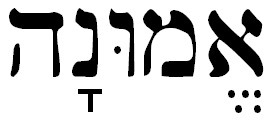by Lois Tverberg
Faithful are the wounds of a friend, but the kisses of an enemy are excessive. (Proverbs 27:6, New English Translation)
Understanding a little more about Hebrew words can help us see why one verse can be translated in different ways. More interestingly, having two different translation of a verse often gives us a new “depth-perception,” just as the combination of images in both of eyes shows us the three dimensions of the world around us.
One interesting way to see this is that in most Christian translations, Proverbs 27:6a reads, “Faithful are the wounds of a friend,” or “The wounds of a friend can be trusted.” But the version of the Tanakh by the Jewish Publication Society translates that verse differently, as “Wounds by a loved one are long-lasting.” One casts hurtful statements in a positive light, the other points out how painful they are. Why is that?
The answer is intriguing. The Hebrew word that has been translated “faithful” is ne’emanim (neh-eh-mah-NEEM), which is related to the word emunah, which means “faithful” or “reliable.” It is also related to the verb aman, meaning to believe or trust. But the same word can also mean “steadfast, long-lasting, enduring.” So the wounds of a friend can be trustworthy and reliable, or they can be long-lasting, in the sense of never going away.
Which is the correct translation? Ironically, I think it is both. When our loved ones tell us their greivances, often they are something we should seriously consider changing, because they know that telling us will hurt us. But on the other hand, the speaker should realize that no matter how carefully said, his or her words will tend to stay with the hearer forever, often causing a wound that will take a long time to heal.
Words are like knives that with the slightest mishandling can cause great pain. Any time we say something critical to a person, we should consider carefully that it will likely affect our relationship for a long time. Is it really that necessary to “get something off our chest”? Only when we choose our words with the realization that they will have a long-lasting impact on others will they be faithful in helping them as well.
Reckless words pierce like a sword,
but the tongue of the wise brings healing. (Proverbs 12:18)
~~~~
See Listening to the Language of the Bible, by Lois Tverberg and Bruce Okkema, En-Gedi Resource Center, 2004. This is a collection of devotional essays that mediate on the meaning of biblical words and phrases in their original setting.
For a friendly, bite-sized Bible study of five flavorful Hebrew words, see 5 Hebrew Words that Every Christian Should Know, by Lois Tverberg, OurRabbiJesus.com, 2014 (ebook).




